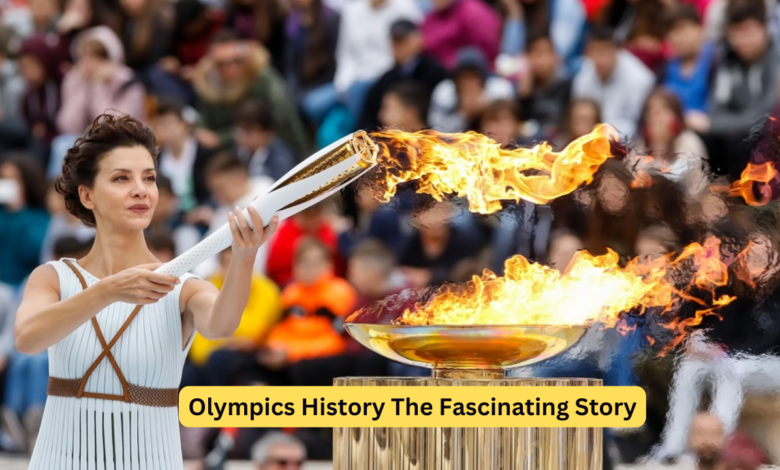Olympics History The Fascinating Story

Olympics History The Fascinating Story, The history of the Olympics is a journey through time, beginning with the ancient Greek Games held in Olympia. This tradition, starting in the 8th century BC and lasting until the 4th century AD, laid the groundwork for what we now know as the modern Olympic Games. But how did these ancient festivals inspire the global spectacle we celebrate today?
In this article, we’ll dive into the intriguing history of the Olympics, exploring their origins, evolution, and the key figures who have shaped their development over the centuries. From the ancient Greeks to Baron Pierre de Coubertin, the father of the modern Olympics, we’ll uncover how these games have transformed and why they continue to capture the world’s imagination.
The Origins of the Ancient Olympics
The Birth of the Games in Ancient Greece
The ancient Olympic Games were held every four years in Olympia, a sanctuary in the western part of the Peloponnese peninsula. These games were a crucial part of Greek culture, celebrated with athletic competitions, religious ceremonies, and communal feasts. They were dedicated to Zeus, the king of the gods, and were seen as a way to honor him and bring together the Greek city-states.
The Events and Traditions
The original Olympic Games featured a variety of events, including running, wrestling, chariot racing, and the pentathlon, which combined five different disciplines. Athletes competed for the glory of victory and the olive wreath, the highest honor. Unlike modern times, there were no gold, silver, or bronze medals. The games were also a time of peace, with a truce declared to allow safe travel for competitors and spectators.
The Decline and Revival of the Games
The Fall of the Ancient Olympics
As the Roman Empire expanded, the focus of the games shifted. By the 4th century AD, the Olympics faced decline, and in 393 AD, Emperor Theodosius I officially abolished them, citing their pagan origins. This marked the end of the ancient Olympics, leaving a significant gap in their history until their revival.
The Olympics History
The modern Olympics owe their existence to the vision of Baron Pierre de Coubertin, a French educator and historian. Inspired by the ancient games and motivated by a desire to promote peace and international understanding, de Coubertin spearheaded the movement to revive the Olympics in the late 19th century. His efforts led to the first modern Olympics held in Athens in 1896, marking a new era in the history of the Games.
The Modern Olympics: A Global Phenomenon
The Evolution of the Games
Since their revival, the Olympics have evolved dramatically. From the first modern games in Athens, the Olympics have grown into a global event that attracts thousands of athletes and millions of spectators from around the world. Innovations such as the introduction of the Winter Olympics in 1924, the inclusion of women’s events, and the use of technology in broadcasting and scoring have transformed the Games into a multi-billion dollar spectacle.
The Impact of the Olympics on Global Culture
The Olympics have a profound impact on global culture, bringing together people from diverse backgrounds and fostering a sense of unity and pride. The Games serve as a platform for showcasing athletic talent, promoting sportsmanship, and addressing global issues such as racism and gender equality. The Olympics also drive significant economic benefits for host cities and countries, highlighting the power of sports to influence society.
Controversies and Challenges
Political and Social Issues
Throughout their history, the Olympics have not been without controversy. Political disputes, such as the boycott of the 1980 Moscow Olympics and the 1984 Los Angeles Olympics, have cast a shadow over the Games. Additionally, issues such as doping scandals and the commercial pressures faced by athletes and organizers continue to challenge the integrity of the Olympics.
The Future of the Games
As we look to the future, the Olympics face both opportunities and challenges. With the rise of digital media and changing global dynamics, the Games must adapt to remain relevant and inclusive. Initiatives to make the Olympics more sustainable and accessible, such as the introduction of new sports and the focus on environmental responsibility, are crucial in shaping the future of this iconic event.
The Legacy of the Olympics
Celebrating Athletic Achievement
One of the most enduring legacies of the Olympics is the celebration of athletic achievement. The Games provide a platform for athletes to showcase their skills and compete at the highest level. The stories of perseverance, dedication, and triumph inspire millions around the world and highlight the universal appeal of sports.
Fostering International Unity
The Olympics also play a significant role in fostering international unity. By bringing together athletes and spectators from diverse backgrounds, the Games promote understanding and cooperation. The Olympic motto, “Citius, Altius, Fortius” (Faster, Higher, Stronger), embodies the spirit of excellence and unity that defines the Olympics.
The Role of Technology in Shaping the Olympics
Technological Innovations and the Games
The role of technology in the Olympics has been transformative, enhancing both the athlete’s experience and the spectator’s enjoyment. Advances such as high-definition broadcasting, instant replay, and digital timing systems have revolutionized how the Games are presented and experienced. Innovations like virtual reality and augmented reality are beginning to provide fans with immersive experiences, allowing them to engage with the Olympics in new and exciting ways. These technological advancements not only ensure fairness and accuracy in competition but also broaden the reach of the Games to a global audience, making the Olympics more accessible than ever before.
Addressing Challenges with Technology
While technology has greatly benefited the Olympics, it also presents challenges. Issues such as digital privacy, data security, and the digital divide between different regions can affect how the Games are perceived and experienced. Ensuring that technological advancements are implemented in a way that upholds the values of fairness and integrity is crucial. The International Olympic Committee and other stakeholders must navigate these challenges carefully to maintain the spirit of the Games while embracing the benefits of technology.
Conclusion
The history of the Olympics is a rich tapestry of tradition, transformation, and global impact. From their ancient origins in Greece to their modern revival and evolution, the Games continue to captivate and inspire. As we celebrate the legacy of the Olympics, we must also consider their future and the role they play in shaping our world.
What are your thoughts on the evolution of the Olympics? How do you think the Games will continue to influence global culture in the coming years? Share your reflections in the comments below!
For more information on the history and impact of the Olympics, check out these additional resources:




One Comment